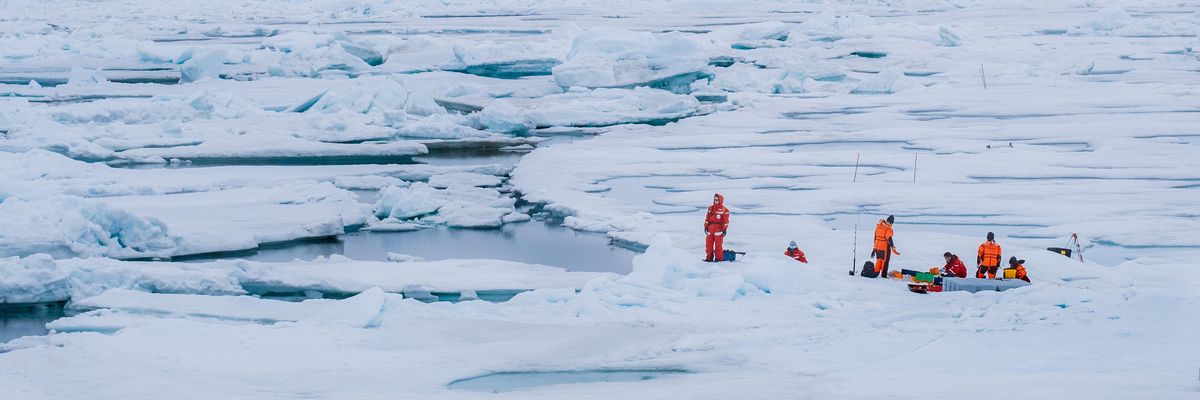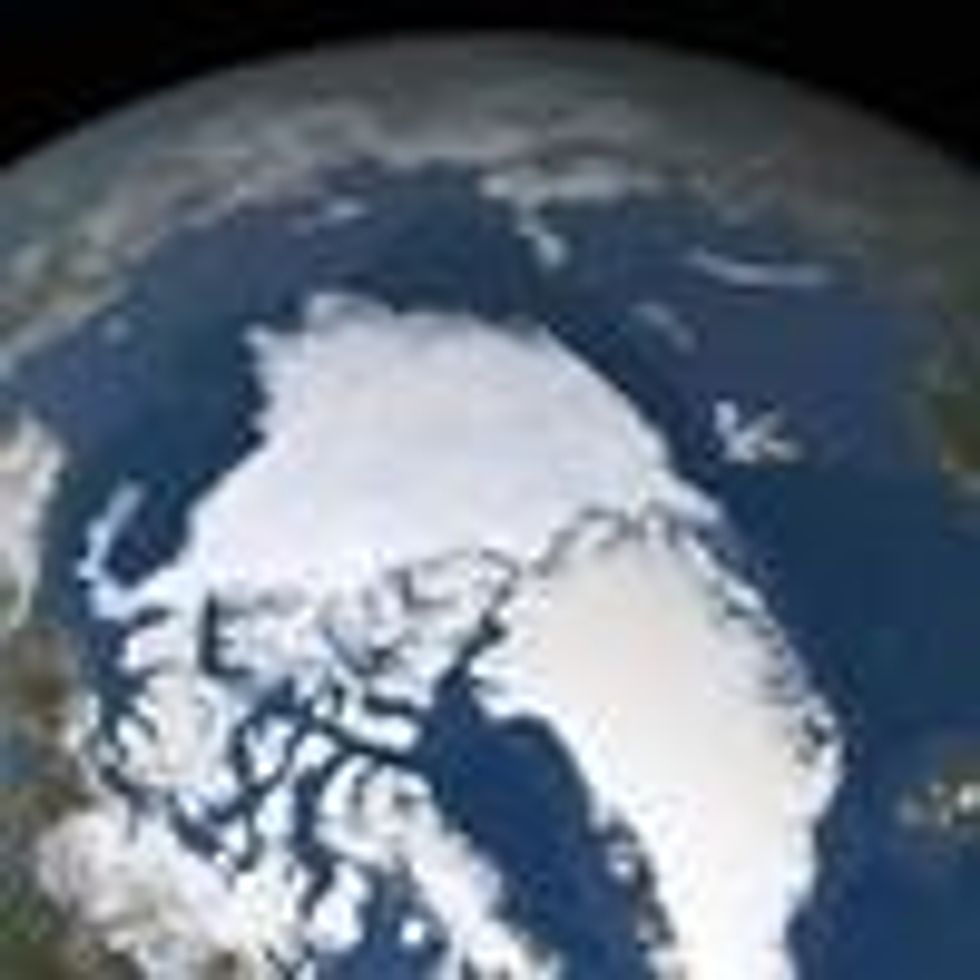
Members of the MOSAiC expedition conduct Arctic research in 2019. (Photo: Alfred-Wegener-Institut /Lianna Nixon/CC-BY 4.0)
To donate by check, phone, or other method, see our More Ways to Give page.

Members of the MOSAiC expedition conduct Arctic research in 2019. (Photo: Alfred-Wegener-Institut /Lianna Nixon/CC-BY 4.0)
New research published Wednesday revealed the Arctic Ocean has been warming for decades longer than scientists previously understood, raising fresh concerns as the polar region faces the growing threat of a total loss of the seasonal ice that is crucial to the survival of the imperiled marine ecosystem.
"We're talking about the early 1900s, and by then we've already been supercharging the atmosphere with carbon dioxide."
A study published in Science Advances found that "the recent expansion of Atlantic waters into the Arctic Ocean"--a phenomenon knows as "Atlantification"--offers "undisputable evidence of the rapid changes occurring in this region."
"We reconstruct the history of Atlantification along the eastern Fram Strait during the past 800 years using precisely dated paleoceanographic records," the study's authors wrote, referring the the maritime passage between Greenland and Svalbard. "Our results show rapid changes in water mass properties that commenced in the early 20th century--several decades before the documented Atlantification by instrumental records."
Study co-author Tessi Tommaso of the Institute of Polar Sciences at the National Research Council in Bologna, Italy, said in a statement that "when we looked at the whole 800-year timescale, our temperature and salinity records look pretty constant. But all of a sudden at the start of the 20th century, you get this marked change in temperature and salinity--it really sticks out."
\u201cThe Arctic Ocean has been warming since the start of 1900s \u2014 decades earlier than models suggested, according to a new study.\n\n"It is possible that the Arctic Ocean is more sensitive to greenhouse gases than previously thought," one of the authors told me. https://t.co/3I6CinNeo4\u201d— Rachel Ramirez (@Rachel Ramirez) 1637781122
Francesco Muschitiello--one of the study's authors and a Cambridge University geographer--told CNN that "the Arctic Ocean has been warming up for much longer than we previously thought. And this is something that's a bit unsettling for many reasons, especially because the climate models that we use to cast projections of future climate change do not really simulate these type of changes."
"We're talking about the early 1900s, and by then we've already been supercharging the atmosphere with carbon dioxide," he continued. "It is possible that the Arctic Ocean is more sensitive to greenhouse gases than previously thought. This will require more research, of course, because we don't have a solid grip on the actual mechanisms behind this early Atlantification."
Related Content

In September, Common Dreams reported that Arctic sea ice shrank to its second-smallest extent since record-keeping began more than four decades ago.
The new study also follows research published September in the journal Earth's Future showing that the Last Ice Area--which is north of Canada and Greenland and is where the remaining summer sea ice will persist the longest as the climate emergency progresses--could disappear completely by 2100.
\u201c"If the year-round ice goes away, entire ice-dependent ecosystems will collapse, and something new will begin."\n\nhttps://t.co/POWGilOaKV\u201d— American Littoral Society (@American Littoral Society) 1637514302
"Unfortunately, this is a massive experiment we're doing," study co-author Robert Newton, a climate researcher at Columbia University and co-author of the Last Ice Area study, said in a statement. "If the year-round ice goes away, entire ice-dependent ecosystems will collapse, and something new will begin."
Donald Trump’s attacks on democracy, justice, and a free press are escalating — putting everything we stand for at risk. We believe a better world is possible, but we can’t get there without your support. Common Dreams stands apart. We answer only to you — our readers, activists, and changemakers — not to billionaires or corporations. Our independence allows us to cover the vital stories that others won’t, spotlighting movements for peace, equality, and human rights. Right now, our work faces unprecedented challenges. Misinformation is spreading, journalists are under attack, and financial pressures are mounting. As a reader-supported, nonprofit newsroom, your support is crucial to keep this journalism alive. Whatever you can give — $10, $25, or $100 — helps us stay strong and responsive when the world needs us most. Together, we’ll continue to build the independent, courageous journalism our movement relies on. Thank you for being part of this community. |
New research published Wednesday revealed the Arctic Ocean has been warming for decades longer than scientists previously understood, raising fresh concerns as the polar region faces the growing threat of a total loss of the seasonal ice that is crucial to the survival of the imperiled marine ecosystem.
"We're talking about the early 1900s, and by then we've already been supercharging the atmosphere with carbon dioxide."
A study published in Science Advances found that "the recent expansion of Atlantic waters into the Arctic Ocean"--a phenomenon knows as "Atlantification"--offers "undisputable evidence of the rapid changes occurring in this region."
"We reconstruct the history of Atlantification along the eastern Fram Strait during the past 800 years using precisely dated paleoceanographic records," the study's authors wrote, referring the the maritime passage between Greenland and Svalbard. "Our results show rapid changes in water mass properties that commenced in the early 20th century--several decades before the documented Atlantification by instrumental records."
Study co-author Tessi Tommaso of the Institute of Polar Sciences at the National Research Council in Bologna, Italy, said in a statement that "when we looked at the whole 800-year timescale, our temperature and salinity records look pretty constant. But all of a sudden at the start of the 20th century, you get this marked change in temperature and salinity--it really sticks out."
\u201cThe Arctic Ocean has been warming since the start of 1900s \u2014 decades earlier than models suggested, according to a new study.\n\n"It is possible that the Arctic Ocean is more sensitive to greenhouse gases than previously thought," one of the authors told me. https://t.co/3I6CinNeo4\u201d— Rachel Ramirez (@Rachel Ramirez) 1637781122
Francesco Muschitiello--one of the study's authors and a Cambridge University geographer--told CNN that "the Arctic Ocean has been warming up for much longer than we previously thought. And this is something that's a bit unsettling for many reasons, especially because the climate models that we use to cast projections of future climate change do not really simulate these type of changes."
"We're talking about the early 1900s, and by then we've already been supercharging the atmosphere with carbon dioxide," he continued. "It is possible that the Arctic Ocean is more sensitive to greenhouse gases than previously thought. This will require more research, of course, because we don't have a solid grip on the actual mechanisms behind this early Atlantification."
Related Content

In September, Common Dreams reported that Arctic sea ice shrank to its second-smallest extent since record-keeping began more than four decades ago.
The new study also follows research published September in the journal Earth's Future showing that the Last Ice Area--which is north of Canada and Greenland and is where the remaining summer sea ice will persist the longest as the climate emergency progresses--could disappear completely by 2100.
\u201c"If the year-round ice goes away, entire ice-dependent ecosystems will collapse, and something new will begin."\n\nhttps://t.co/POWGilOaKV\u201d— American Littoral Society (@American Littoral Society) 1637514302
"Unfortunately, this is a massive experiment we're doing," study co-author Robert Newton, a climate researcher at Columbia University and co-author of the Last Ice Area study, said in a statement. "If the year-round ice goes away, entire ice-dependent ecosystems will collapse, and something new will begin."
New research published Wednesday revealed the Arctic Ocean has been warming for decades longer than scientists previously understood, raising fresh concerns as the polar region faces the growing threat of a total loss of the seasonal ice that is crucial to the survival of the imperiled marine ecosystem.
"We're talking about the early 1900s, and by then we've already been supercharging the atmosphere with carbon dioxide."
A study published in Science Advances found that "the recent expansion of Atlantic waters into the Arctic Ocean"--a phenomenon knows as "Atlantification"--offers "undisputable evidence of the rapid changes occurring in this region."
"We reconstruct the history of Atlantification along the eastern Fram Strait during the past 800 years using precisely dated paleoceanographic records," the study's authors wrote, referring the the maritime passage between Greenland and Svalbard. "Our results show rapid changes in water mass properties that commenced in the early 20th century--several decades before the documented Atlantification by instrumental records."
Study co-author Tessi Tommaso of the Institute of Polar Sciences at the National Research Council in Bologna, Italy, said in a statement that "when we looked at the whole 800-year timescale, our temperature and salinity records look pretty constant. But all of a sudden at the start of the 20th century, you get this marked change in temperature and salinity--it really sticks out."
\u201cThe Arctic Ocean has been warming since the start of 1900s \u2014 decades earlier than models suggested, according to a new study.\n\n"It is possible that the Arctic Ocean is more sensitive to greenhouse gases than previously thought," one of the authors told me. https://t.co/3I6CinNeo4\u201d— Rachel Ramirez (@Rachel Ramirez) 1637781122
Francesco Muschitiello--one of the study's authors and a Cambridge University geographer--told CNN that "the Arctic Ocean has been warming up for much longer than we previously thought. And this is something that's a bit unsettling for many reasons, especially because the climate models that we use to cast projections of future climate change do not really simulate these type of changes."
"We're talking about the early 1900s, and by then we've already been supercharging the atmosphere with carbon dioxide," he continued. "It is possible that the Arctic Ocean is more sensitive to greenhouse gases than previously thought. This will require more research, of course, because we don't have a solid grip on the actual mechanisms behind this early Atlantification."
Related Content

In September, Common Dreams reported that Arctic sea ice shrank to its second-smallest extent since record-keeping began more than four decades ago.
The new study also follows research published September in the journal Earth's Future showing that the Last Ice Area--which is north of Canada and Greenland and is where the remaining summer sea ice will persist the longest as the climate emergency progresses--could disappear completely by 2100.
\u201c"If the year-round ice goes away, entire ice-dependent ecosystems will collapse, and something new will begin."\n\nhttps://t.co/POWGilOaKV\u201d— American Littoral Society (@American Littoral Society) 1637514302
"Unfortunately, this is a massive experiment we're doing," study co-author Robert Newton, a climate researcher at Columbia University and co-author of the Last Ice Area study, said in a statement. "If the year-round ice goes away, entire ice-dependent ecosystems will collapse, and something new will begin."